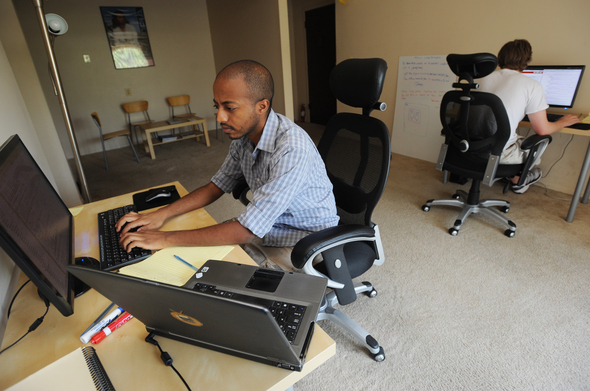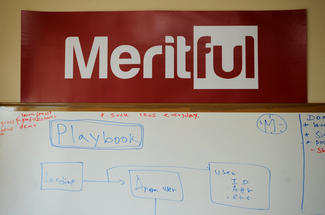Starting from scratch: 'Every startup has a runway ... leading to a cliff'

Azarias Reda sits in the converted living room of his apartment as he and his lone employee Jack Schultz program what they hope will be the next big social media website for high school students.
Melanie Maxwell | AnnArbor.com
I thought it would be interesting to find someone who is still on the first rung in order see what it was actually like for startups before they struck pay-dirt.
Azarias Reda has worked at Microsoft and LinkedIn, and he just received his Ph.D. from the University of Michigan. He now lives in a small three-room apartment in Ypsilanti that doubles as the office space for his startup company, Mertiful.
'This is our work room, and this is my bedroom'
Most startup companies begin with some version of the same story. There are many paths, many different types of funding and support, and many types of companies, but most start out as one person with a unique idea.
Reda, who was born in Ethiopia, grew up in northern Virginia, received his undergrad degree in Kansas, and had an idea to create a LinkedIn-type network for high school students.
“High school students are online every day, and they’re generating a lot of content that might not be entirely helpful to them,” he said.
“With Meritful, we will give them a platform to actually talk about the things they are proud of, not the party they went to or what they ate for lunch.”
Reda and Jack Schultz, a third year undergraduate computer engineering student at Michigan, sit back to back from each other in the converted living or dining room. Reda said the apartment, with the office, a “nap room” (a sparse room with a TV and a sleeping bag on the floor), a small kitchen, and his bedroom, are being paid for with money he raised from family and friends.
“It’s what I live on, it’s what pays for the apartment, and it’s how I was able to bring on Jack,” he said.
“Luckily I was able to get enough money to start off so that we don’t have the banks breathing down our neck.”
'Every startup has a runway, and it’s leading right to a cliff'
The issue of money is a touchy subject for startups. Learning the ins and outs of different types of funding can be daunting, and many startups resist funding that comes with too many strings attached.
“Every startup has a runway,” Reda said. “And that runway is leading to a cliff. Any bit of funding you can find extends that runway, but at a certain point you will either fly or fall.”
That runway is different for every company. Toby Brzoznowski co-founded LLamasoft, a supply chain design software company that now employs more than 120 people, in a small office on Washington Street in Ann Arbor.
“Trying to compare startups is not like comparing apples to apples. They have the same name but no two are going to be the same,” he said. “We were able to bring a product to market with no funding, but that does not work for everyone.”
Reda said he hopes to develop Meritful more before he seeks venture capital for the project.
“If people invest very early, they are investing in just you and an idea. That’s a very, very risky investment,” Reda explained.

Reda and Shultz display their working logo and their daily motto in the office.
Melanie Maxwell | AnnArbor.com
'Suck less every day'
Starting a company is not easy. There have already been ups and downs for Reda and Schultz, and they only started in April. Reda said it can be frustrating because he and Schultz are technical founders, but so much of what goes in to founding a company is not on the technical side.
“We know how to build a software system. Michigan is a great school, and it taught us how to do that,” he said.
“But if it was just building software you could outsource it and we’d have a lot more successful companies than we do now. The hard part comes in getting our user base together, finding our clients and our customers, acquiring funding, and building out the whole package.”
Reda and Schultz have a long way to go before they have the whole package put together. They hope to release a version in August that Reda calls the “minimum viable product.” Once they have a small group of real high schoolers trying out the site, they will start to talk to interested parties about a first round of investment.
After that, the product might take off, or it might crash.
“For now we’re just taking it slow and trying to suck less every day,” Reda said. “We want to learn one thing every day.”
“Hopefully more than one thing,” Schultz chimed in.
Ben Freed covers business for AnnArbor.com. Reach him at 734-623-2528 or email him at benfreed@annarbor.com. Follow him on twitter @BFreedinA2


Comments
Dug Song
Tue, Jul 24, 2012 : 4:35 a.m.
Nice piece, Ben! Thanks for covering the local tech beat - you (and anyone in the community) are always welcome to join us at the monthly http://a2newtech.org meetup (2,000+ members), where we showcase 5 new tech startups every month. FWIW, Meritful is a finalist for the TechStars accelerator program (Boston edition; former Ann Arbor startups Occipital and TempoDB are also successful TechStars alum), wish them luck!
Arborcomment
Sun, Jul 22, 2012 : 10:36 p.m.
And remember, "if you've got a business, you didn't build that. Somebody else made that happen".
Arborcomment
Mon, Jul 23, 2012 : 9:09 p.m.
Ron, unless you dispute the figures (they are from the Congressional Budget Office), they are the aggregate of tax liabilities by income bracket. Again, the top 20% of income earners pay 86% of the bill. And yes, between a couple thousands of pages of tax code, home mortgage interest deductions, and whatever debate you want to have about why capital gains and dividends are taxed lower (and twice) - you'll find folks with creative percentages on the margins. But bottom line, the top 20% pay 86% of the bill, and 49% of all wage earners pay no federal income taxes - so when it comes down to the "somebody" that paid for the infrastructure, we know whom did 86 percent of it, and who did zero.
Ron Granger
Mon, Jul 23, 2012 : 7:24 p.m.
Arborcomment, there are plenty of people who make $50K or $100K a year and pay less than a 15% tax rate. Just because the money comes from dividends or capital gains does not mean it should be taxed at a lower rate. A friend owns part of his Dad's company. His income is all from dividends. He does not work. He pays extremely low taxes - less than 15%. Why should a self employed consultant pay 30% to his 15%?
Arborcomment
Mon, Jul 23, 2012 : 1:41 p.m.
And this is the part where I point out that the top 20% pay 86% of individual income tax liabilities, the top 10% pay 72.7%, top 5% pay 61%, top 1% 39.5% and only a tenth of the top one percent pay around 15% because of their use of capital gains which is a tax on top of what was already taxed prior to the capital investment. And even if you did manage to effectively gore the rich with some percentage that you think is fair in your learned opinion and judgemental authority, it would not even come close to fixing the deficit.
Ron Granger
Mon, Jul 23, 2012 : 12:10 p.m.
"No free ride Ron, unless you're one of the 49% that don't pay income taxes." Those who make millions but pay less than 15% are getting a nearly free ride. They aren't paying thir fair share.
Arborcomment
Mon, Jul 23, 2012 : 11:25 a.m.
And unless the successful business owner has come from another country to here and started a business immediately, he/she, and/or the parents have been that "somebody" too via taxes to pay for that infrastructure. And, as the business owner decides to hire and pay additional employees, those folks pay taxes for the infrastructure as well via the jobs the owner has created. No free ride Ron, unless you're one of the 49% that don't pay income taxes.
Ron Granger
Mon, Jul 23, 2012 : 1:48 a.m.
Yep - if your business uses infrastructure, you didn't build that. Somebody else made that happen.
Azarias Reda
Sun, Jul 22, 2012 : 7:45 p.m.
Thank you for the write up! When all is said and done, working on start up is a great experience. We enjoy building something new everyday at Meritful, and we look forward to helping high school students articulate all their hard work and amazing experiences. You can follow us on our blog at blog.meritful.com Go blue!
Yidnek
Sun, Jul 22, 2012 : 6:50 p.m.
Where were the rainbow bubbles around Zuckerberg's few years ago? A great innovation! Berta Wendime. "Yichalal"-Possible
morph
Sun, Jul 22, 2012 : 6:35 p.m.
Very exciting..despite the cliff. Hope Meritful flies. Best of luck!!
yua
Sun, Jul 22, 2012 : 6:02 p.m.
Hey guys, the name of the company is Meritful, not Mertiful. Please fix the spelling on the link, thanks.
North Campus
Sun, Jul 22, 2012 : 5:38 p.m.
Startups are awesome. Things move so fast, and you have to adjust on the fly. Otherwise, you don't get to fly. It is great to be able to test a product, and then ask for investment, than to try and sell your audience. Good luck to Meritful!
Macabre Sunset
Sun, Jul 22, 2012 : 5:29 p.m.
This doesn't sound like one of those cases. Maybe if you're trying to get grant money it works that way. But venture capitalist groups are a lot more discerning than the government, and it seems like Reda knows his way around and wants to build something that will deserve some real investment attention. Somehow the small businessman has been turned into an enemy of the people these days. I've never seen a climate before when actually striving to build a business was viewed as taking advantage of the people. It reminds me of high school where some kids get picked on for doing their homework and trying to do extra credit assignments. I wonder if this hostile attitude is what got Greece started toward its current desperate predicament. I hope Freed continues to highlight local small businesses, and maybe people in this area will start to see that they're not our enemies - they're our future leaders.
DeeDee
Thu, Jul 26, 2012 : 1:08 p.m.
Have you ever tried to raise money from VC or the government? Having raised millions from both, I can tell you that although the processes are very different, it is NOT necessarily easier to raise it from the government - which does a lot of due diligence. Extrapolating from what you read on right wing websites about Solyndra doesn't tell the whole story.
Ron Granger
Sun, Jul 22, 2012 : 3:58 p.m.
Those guys have a lot of space to stretch compared to some startups! And even some places that aren't startups. It is intresting to compare transparency in business. Some businesses - startup or otherwise - are very transparent about just how much cash they have, and the rate of burn. If they don't give updates at least once a month to everyone, run away.